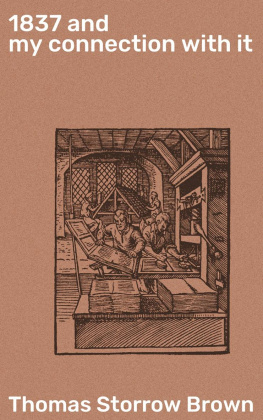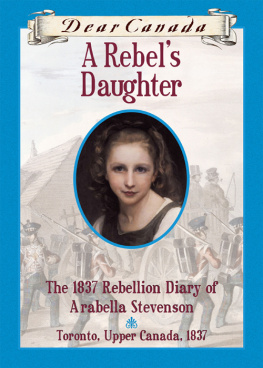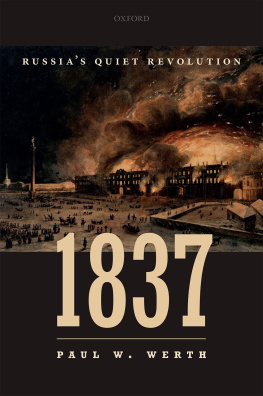1837 and my connection with it (1)
Table of Contents
Born in St. Andrews, Province of New Brunswick, I am a "good Tory," and not of a Revolutionary stock. My father's father, a Boston merchant, sacrificed his all for the Royal cause, and left for Halifax with General Gage, when Boston was evacuated, in 1776. My mother's mother emigrated from Postmouth to New Brunswick, with a daughter married to Captain Storrow, of the British army, from whom my name was taken. She was a "Wentworth," cousin to John Wentworth (afterwards Sir John, Governor of Nova Scotia), the last Royal Governor of New Hampshire; niece to Sir Berning, his predecessor; and granddaughter to John Wentworth, who preceded him. These three "Wentworths" - father, son, and grandson, - having governed New Hampshire for more than forty years.
When, at fifteen years of age, I came to Montreal, in the year 1818, I was already a politician from much reading of newspapers; but forming my ideas of what was right in men and things mostly from the lessons contained in "Plutarch's Lives." In the same year the Parliament of Lower Canada was for the first time called upon to make provision for the "Civil List," which included payment of all provincial salaries, in accordance with an offer made in 1810.
In those days there was no "Responsible Government" in the colonies, and no Colonial Ministry. Each had a House of Assembly elected by the people, a Legislative Council appointed for life by the Crown, and a Governor, who was some old military officer left on the hands of the Home Ministry by the Peace of 1815, and who knew little of governing beyond the word of command. The Executive Council, responsible no where, and to nobody, was a mere council of advice. That in Lower Canada became a controlling power. The representatives of the people could debate and vote, but there were no means of carrying on their decisions.
Our Parliament had at this time existed for nearly thirty years, with nominally all the powers of the British House of Commons; but in the long period when our insufficient revenue required that a large portion of the "Civil List," or expenditure for provincial purposes, should be paid from the Military Chest - That is, British Treasury, through the Commissariat - The Assembly could hardly question the expenditure, or its particular distribution.
I shall in this article use the words "Canadian", and "English", as the French use them and accord to our common acceptation here, - the first meaning non but French Canadians; and the second, all who are not French Canadians. With the call upon the Assembly to provide for the Civil List, came the protest that culminated in 1837. The Assembly was Canadian, and acting upon its positive right, demanded that all the revenue of the Province, should be placed at its disposal. The official body, including sinecurists and pluralists, being mostly English in numbers, and more so on the pay-list, instinctly foresaw reduction for their order. The Legislative Council, not a mere obedient appendage like the Legislative Councils of our day, or the "Senate", was a vigorous English body; and, taking part with the office-holders, put itself in direct antagonism to the Assembly. A great portion of the legislation demanded by the people through the Assembly was thrown out by the Council, till in the end there was an accumulation of over three hundred bills, passed by the Lower House, and thrown out by the Upper; and various governmental irregularities were committed, against continued remonstrances.
The constant demand of the Assembly for all the revenue, was met by tardy concessions by the British Government year after year, only to increase irritation; till in the end, as should have been in the beginning, all was surrendered. Then came the voting of supplies. The Assembly, having no other check on the Government, on the office holders, insisted on voting salaries annually and separately to each service or individual. The Governor, supported by the Council, insisted that they should be voted en bloc, - in a lump sum - and for a term of years, to be devided by the Executive; and thus the conduct of public affairs became so insufferable that, in 1828, a deputation from Canadians (there had been deputations in former years) carried home a petition, signed by 87,000 people, which was laid before a Committee of the House of Commons. The Committee entered fully upon the question, gave the delegates a full hearing, and by a report sustained the House of Assembly in its allegations or grievances, but left the remedy in the hands of the Government.
Promises of redress were profuse, but in the multiplicity of reforms required at that time of the British Ministry, ours were overlooked till 1835, when Lord Gosford, a good natured Irish gentleman, of no political capacity or knowledge, was sent out as Governor, accompanied by an ex-captain of Engineers, and an excentric Indian judge to act with him as "Commissioners" to inquire into our grievances. The insult of appointing a commission to inquire into facts that had been re-echoed for fifteen years, when the Parliament of the Province could be the only inquest, was only equalled by the imbecility of selecting three men utterly incompetent for the task. The Commission was never recognized by our Parliament, nor did the British Ministry suppose it would be. It was sent out as a make shift; and its reports, in which in turn each Commissioner differed from his colleagues, ended with the printing.
Lord Gosford, however, did something. He gave at Quebec a St. Catherine's ball, and, to the disgust of all loyal Britons, gave the chief place to a Canadian lady; which disgust was amplified by concessions of many things, before withheld, and a judicious bestowal of offices to certain Canadian politicians. On return, a portion of the Quebec wing of what was now called the "Papineau Party" split off, and desired reconciliation. Satisfied with what they had in hand, and promises of more, they declared the cry for reform meant revolution.
To no party in a colony does the British nation, at home and abroad, owe so much as to the "Papineau Party", to which I had the honor of being attached. To no man born in a colony does the British nation, at home and abroad, owe so much as to Louis Joseph Papineau, - one who, by that spirit that in heroic times falls upon choosen men, towered gigantically amidst his compeers. Though here the struggle was presented as a contest between the French and English, in other colonies it was distinctly between the people and the colonial oligarchy.
In 1837, there was chronic dissatisfaction in every British colony, and each was besieging the Colonial Office for redress of grievances, having their common source in the contest of people, speaking through their Houses of Assembly, and the Colonial Office holders supported by imbecile Governors, through and irresponsible Legislative Council. The unwavering determination of the Papineau Party forced questions to their ultimate decision: and the British Government, when awakened to the necessity, with a magnanimity seldom found in history, acknowledged the errors of the past, and noticed all the colonies that henceforth their own government should be in their own hands, and her authority never again be invoked against their rights. From that time to this there has been no colonial disloyalty, discontent, dissatisfaction, or complaint. The question in England then was, how shall we keep the colonies? The question now is, how can we shake them off?










